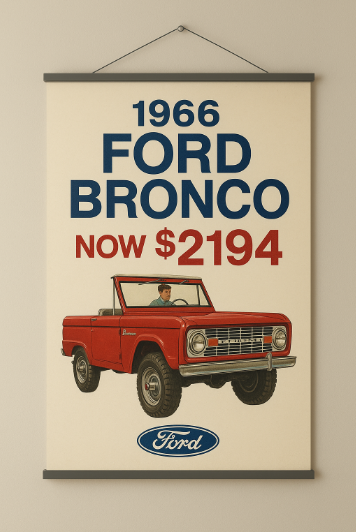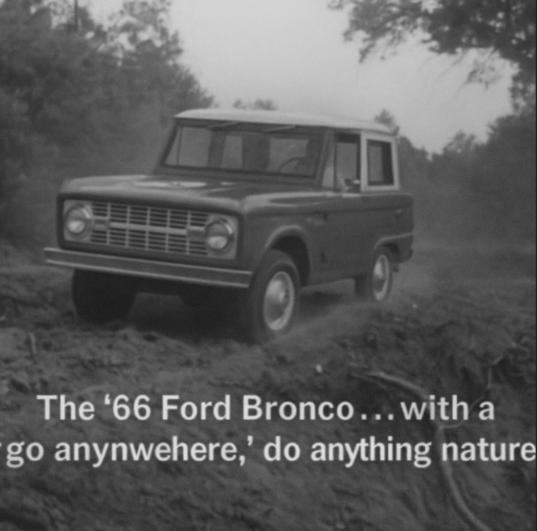When the Ford Bronco was introduced in August 1965 as a 1966 model, Ford wasn’t just releasing another SUV—they were creating an entirely new vehicle category. The original ad campaign was bold, clever, and strategic, targeting a wide range of consumers from outdoor enthusiasts to suburban families. Here’s how Ford introduced the Bronco to the world—and created a lasting legacy.
Magazine Ads: Positioning the Bronco as a Versatile Workhorse
Ford’s initial print campaign focused heavily on versatility, calling the Bronco “a new kind of sports car—with four-wheel drive.” Ads in publications like Life Magazine, Field & Stream, and Popular Mechanics emphasized its multi-purpose appeal, with taglines like:
“The GOING thing from Ford!”
Early ads used illustrations and minimalistic layouts, often showcasing the Bronco on dirt trails, pulling boats, or parked in suburban driveways. These ads made it clear: the Bronco wasn’t just for cowboys—it was for carpenters, campers, and commuters alike.
👉 Example vintage ad scans:

TV Commercials: A Voice of Adventure and Practicality
Ford’s television spots introduced the Bronco as “built for the roughest roads you’ll ever find—and the smoothest ride when you’re back on pavement.” These commercials aired during sports programming and family TV slots, highlighting the Bronco’s rugged independence without sacrificing comfort.
Notably, the 1966 Bronco TV spot featured:
A narrator’s confident voiceover outlining the Bronco’s specs
Footage of the Bronco plowing through sand, mud, and snow
The Bronco Half Cab, Wagon, and Roadster models in action
TV Commercials (1966 Bronco)
📺 1966 Bronco Commercial – YouTube
An old TV commercial showcasing the 1966 Bronco’s capabilities.📺 Rare 1966 Ford Bronco Ad – YouTube
A rare advertisement highlighting the first four-wheel-drive sports car.
Dealership Launch: Creating Buzz Across America
Ford’s dealer network rolled out the Bronco with in-store posters, banners, and brochures that highlighted its $2,194 starting price and customizability. Some dealerships even staged “Bronco test drive rodeos,” inviting customers to try out the vehicle on rugged terrain setups.
Promotional materials included:
Fold-out brochures describing all three body styles
Cutaway illustrations of the suspension and drivetrain
Displays next to the Mustang, playing on Ford’s “stable” of powerful names
Dealership Launch and Brochures
📘 1966 Ford Bronco Brochure – Ford Official PDF
An official Ford brochure detailing the 1966 Bronco’s specifications and features.📎 1966 Bronco Dealer Sales Brochure Reprint – Northeast Classic Ford Parts
A high-quality reprint of the original dealer sales brochure, perfect for restorations.

The Messaging: Go Anywhere, Do Anything
The brilliance of Ford’s messaging lay in its broad yet targeted appeal. By comparing the Bronco to a sports car and a utility vehicle, Ford captured the imagination of a new type of buyer—those who wanted freedom, functionality, and fun all in one package.
“The Bronco is ready for anything—from building fences to building sandcastles.”
This early branding laid the groundwork for the Bronco’s iconic status, influencing future models, spin-offs like the Bronco II, and even the 2021 reboot that leaned heavily on heritage marketing.
Legacy of the Campaign
The 1966 Bronco campaign didn’t just sell a truck—it defined a culture. Enthusiasts today still collect original ads and dealership brochures, and they remain a vital part of any classic Bronco restoration project or display.
Further Reading
📚 A Brief History of the Ford Bronco Generations – Hagerty
An article detailing the evolution of the Ford Bronco across its generations.📚 The 1966 Ford Bronco Was the Start of Something Big for Ford – Hemmings
An in-depth look at the significance of the 1966 Bronco in Ford’s history.
Ford’s introduction of the 1966 Bronco was a masterclass in multi-channel marketing. From magazine spreads and TV commercials to in-person dealership events, they launched not just a vehicle—but an American icon.
If you’re restoring or researching a vintage Bronco, or just fascinated by mid-century automotive marketing, the 1966 campaign is where it all began.
